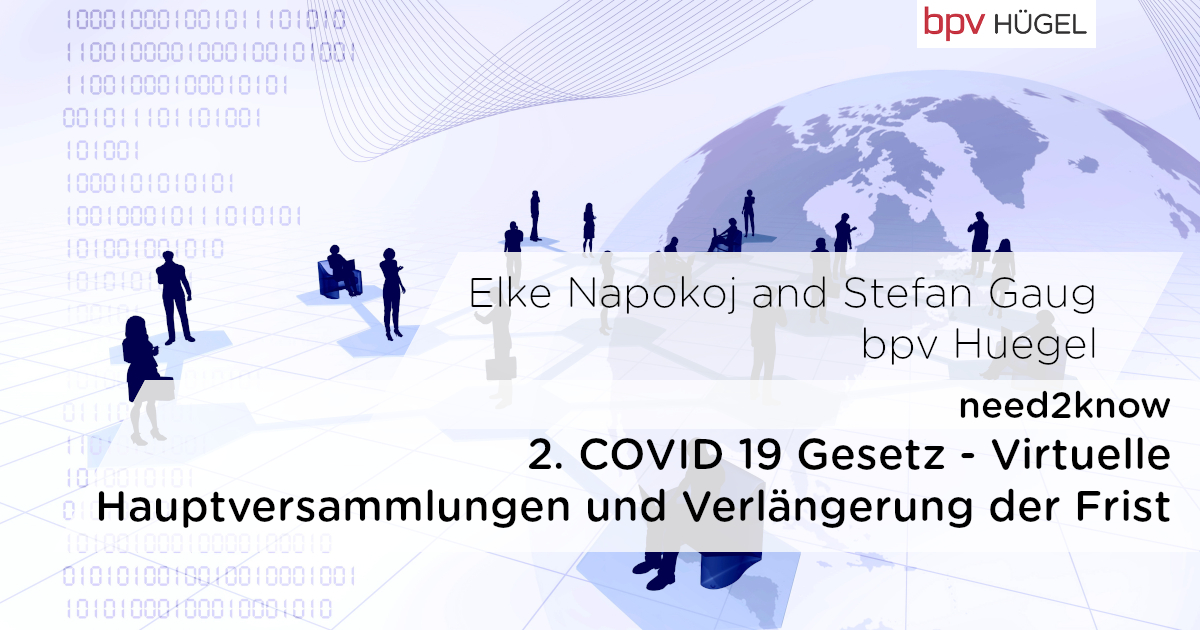23 March 2020 – need2know
The current situation raises many questions in connection with the holding of shareholders’ meetings, in particular whether and under what circumstances meetings may be held. In the following, a short overview of the essential changes for shareholders’ meetings on the basis of the COVID-19 Act is given.
Restrictions on shareholders’ meetings
According to the current information on the homepage of the Federal Ministry of Social Affairs, Health, Care and Consumer Protection, events are completely banned to prevent the dissemination of COVID-19. No more than five people should be in any one place at any one time. For this reason, it would not be possible to hold a shareholders’/partner meeting of a corporation or partnership in which more than five people attend. Since every shareholder/partner may in principle be physically present at the meeting (unless excluded by the chairman of the meeting due to disturbances), it would also not be permissible to exclude shareholders/partners from a meeting on this basis. In most companies, especially public companies, this limit would therefore be exceeded many times over.
COVID-19 Act on Corporate Law – Meeting requirements
In order to put a stop to this problem, the following important changes come into force today:
- For the duration of the measures taken to prevent dissemination of COVID-19 according to the COVID-19 Measures Act (Federal Law Gazette I 2020/12), meetings of shareholders and board members of a corporation or partnership can also be held without the physical presence of the participants (Article 32 § 1 (1) of the COVID-19 Act on Corporate Law).
- The Federal Minister of Justice has been authorised to issue a decree laying down more detailed regulations concerning the holding of the aforementioned meetings which are to ensure a comparable quality of decision-making.
The provisions of Article 32 § 1 (1) of the COVID-19 Act on Corporate Law concerning the holding of meetings without physical presence take precedence – as special statutory provisions – over any deviating provisions in the Articles of Association. The use of technical means of communication – in particular the “qualified video conference” already known from corporate law practice – should make it possible to reach a comparably high quality in the decision making process even without holding a meeting in person. Therefore, a legal basis for such virtual meetings and other forms of decision-making (e.g. written votes) is to be created temporarily by Art 32 § 1 2nd COVID-19 Act, whereby more detailed regulations are reserved for a decree to be issued by the Federal Minister of Justice (Explanation IA 397/A 27th GP on Art 32 2nd COVID-19 Act).
However, qualified video conferences can present companies with technical challenges. In a qualified video conference, all participants must be able to see and hear each other, the audio-visual quality must allow authentic recording of the details of human facial expressions, gestures and intonation, and communication must be protected against unauthorised access.
For smaller meetings, up to a maximum of 10-15 people, common video conferencing solutions with an appropriate security standard should meet these requirements well. For meetings with a larger group of people, however, more specific solutions will have to be used to meet the requirements of taking minutes and determining vote results.
It is hoped that the regulation to be issued by the Federal Minister of Justice will bring further clarifications in this respect. It will also be noteworthy if there will be concrete statements with regard to the notarial certification that is required in various cases.
Ordinary general meetings of public limited companies
A further significant simplification for public limited companies is contained in Art 32 § 2 2nd COVID-19 Act. The period within which the annual general meeting of a public limited company must take place will be extended to twelve months until the end of 2020. This provision takes precedence – as special legal provisions – over any deviating provisions in the articles of association (Explanation IA 397/A 27th CPC to Art 32 2. COVID-19-Act). Thus, stock corporations with a year-end closing date of 31 December can postpone the ordinary general meeting for the financial year 2020 until 31 December 2020 without fear of penalty.
From the point of view of good corporate governance, it is recommended that the annual financial statements as of 31 December 2019, once they have been audited and approved by the Supervisory Board, be published on the company’s homepage entered in the commercial register and made accessible for collection. In order to avoid personal contacts in the sense of the COVID-19 measures, shareholders should be offered the option of having the annual financial statements made available to them by e-mail upon request and asked to refrain from picking them up in person. In the case of stock corporations with a closed circle of shareholders, if there is no homepage in the commercial register, appropriate information could be sent by post and the sending of such information by e-mail could be offered.
Outlook
Current developments make it clearer than ever that electronic means of communication make an indispensable contribution to maintaining the ability of companies to act and make decisions at all times. It is hoped that in this area, in which the legal development has lagged far behind the technological development so far, the present findings will be used to make the legal framework conditions fit for the future, including after the COVID crisis, and to take new technological possibilities into account.
The decree still to be issued by the Federal Minister of Justice in this connection will also be of interest in this context.
Disclaimer
Please note that the information provided here does not replace legal advice. The regulations presented here can be changed by the legislator at short notice. We therefore invite you to visit our information area on a regular basis.
Authors:
Elke Napokoj, Stefan Gaug
Practice Group:
Corporate
If you would like to receive future issues of need2know follow us on LinkedIn or please send an email to subscribe@bpv-huegel.com.

